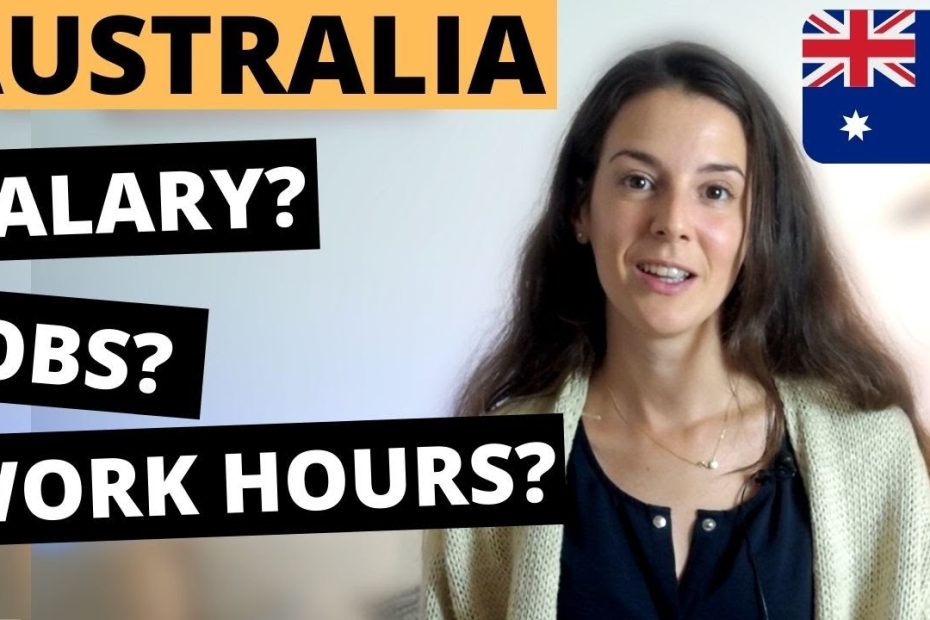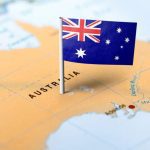Are you looking for a Job in Australia? Perhaps you’re attracted to the country’s stunning landscapes, vibrant culture, and bustling cities. Or maybe you’re looking to gain international work experience and expand your career opportunities.
Whatever your motivation may be, working in Australia as a foreigner can be an exciting and rewarding adventure. But before you pack your bags and head down under, there are a few things you need to know.
In this blog post, we’ll cover everything you need to know about working in Australia as a foreigner, from visa requirements and employment rights to job search strategies and the cost of living. So, whether you’re a recent graduate, a skilled professional, or simply seeking a new adventure, keep reading to discover how you can make the most of your time working in Australia.
Things to Know as a Foreign Worker in Australia
1. Valid Visa:
The first thing to know about working in Australia as a foreign worker is that you will need a valid visa. Without a visa, you will not be legally permitted to work in the country. Australia offers several different types of visas for foreign workers, depending on the nature of your work and your intended length of stay.
If you have a job offer from an Australian employer and your occupation is listed on the Medium and Long-term Strategic Skills List (MLTSSL), you may be eligible for a Temporary Skill Shortage Visa (subclass 482). This visa allows you to live and work in Australia for up to four years, with the possibility of renewal.
On the other hand, if you are a young adult between the ages of 18 and 30 and want to combine travel and work in Australia, you may be eligible for a Working Holiday Visa (subclass 417 or 462). This visa allows you to work and travel in Australia for up to 12 months, with the possibility of extending for an additional 12 months if you meet certain requirements.
It’s important to note that each visa has different eligibility criteria and application requirements, so you need to do your research and ensure that you apply for the right visa that suits your needs. Additionally, visa processing times can vary widely, so it’s best to apply well in advance of your planned arrival in Australia.
2. Requirements and Skills Assessment:
The next important thing to know about working in Australia as a foreign worker is that you may need to have your skills assessed by a relevant authority in Australia before you can apply for a visa. The purpose of this assessment is to ensure that your qualifications and skills meet the necessary standards for your chosen profession.
The specific requirements for skills assessments will depend on the type of visa you are applying for and your occupation. For example, if you are applying for a Skilled Independent Visa (subclass 189), you may need to have your skills assessed by a relevant assessing authority such as Engineers Australia or the Australian Computer Society.
It’s important to note that skills assessments can take time and may involve additional costs, so it’s best to start the process as early as possible. Additionally, it’s important to ensure that your qualifications and experience are recognized in Australia, as some professions may have different requirements than in your home country.
3. Cost of Living:
Would You Like To Apply For This Jobs/Sponsorship?
Enter Your Email Address HERE & You Will Receive a Notification About Your Application. If it shows "Subscribed" CLICK HERE to follow on Telegram for updatesThe cost of living in Australia can be relatively high compared to other countries, especially in the major cities. It’s important to consider this when planning your move and budgeting for your expenses.
Housing is one of the biggest expenses for most people in Australia. Renting a one-bedroom apartment in the city centre can cost anywhere from AUD 1,500 to $3,000 per month, while a similar apartment in the suburbs can range from AUD 1,000 to $2,000 per month. Buying a house or apartment in Australia can be expensive, with median house prices in Sydney and Melbourne often exceeding AUD 1 million.
Other expenses to consider include food, transportation, and healthcare. Eating out in Australia can be pricey, with a basic meal at a restaurant costing around AUD 20-30. However, there are also plenty of budget-friendly options, such as food courts and takeaway outlets.
Public transportation is generally reliable and efficient, with a one-way ticket costing around AUD 4-5 in most cities. Healthcare is of high quality in Australia, but it can also be expensive for non-residents, so it’s important to have adequate health insurance coverage.
Overall, the cost of living in Australia will depend on your lifestyle and location. It’s important to research the cost of living in the specific city or region you plan to live in and to budget accordingly.
4. Employment Rights and Protections:
Once you start working in Australia, you are entitled to certain employment rights and protections, such as minimum wage, workplace health and safety standards, and fair working hours. The Fair Work Ombudsman is the government agency responsible for ensuring that employers comply with these standards, and they offer free advice and resources for workers.
5. Job Search and Strategies:
Another important thing to know as a foreign worker in Australia is the job market and job search strategies. Australia has a strong and diverse economy, with opportunities in a wide range of industries. However, competition for jobs can be fierce, especially in popular cities like Sydney and Melbourne.
It’s important to have a solid job search strategy in place, which may include networking, applying for jobs online, and working with recruitment agencies. Many industries and professions also have specific job search websites and professional associations that can be helpful in your job search.
It’s also important to tailor your resume and cover letter to the Australian job market and to be prepared for potential job interviews. Australian employers value candidates who are professional, proactive and have good communication skills.
Finally, it’s worth noting that many job vacancies in Australia are not advertised, and are instead filled through personal and professional networks. Networking and building relationships with professionals in your industry can be an effective way to uncover hidden job opportunities.
6. Tax System:
If you work in Australia, you will be required to pay income tax on your earnings. The Australian tax system is based on a progressive tax scale, which means that the more you earn, the higher your tax rate will be. You may also be eligible for certain tax deductions and offsets, such as work-related expenses or charitable donations.
In addition to income tax, you will also be required to contribute to Australia’s superannuation system. Superannuation is a retirement savings plan that is mandatory for all employees, including foreign workers. Employers are required to contribute a minimum of 10% of your salary into a superannuation fund, which is designed to provide financial support in retirement.
It’s important to understand your tax obligations and superannuation entitlements when working in Australia, as failing to meet these requirements can result in penalties and fines. It’s recommended to seek professional advice from a registered tax agent or financial advisor to ensure that you are meeting your obligations and maximizing your benefits.
Tips to Reduce the Cost of Living in Australia
Here are some strategies for finding affordable housing and reducing the cost of living in Australia as a foreign worker:
- Share Accommodation: Sharing accommodation with other people can be a great way to reduce your living expenses in Australia. You can search for shared accommodation options on websites like Gumtree, Flatmates.com.au, or Facebook groups. Make sure you take the time to find compatible roommates and establish clear ground rules about living arrangements and expenses.
- Look for Regional Areas: The cost of living in regional areas of Australia is generally lower than in major cities like Sydney or Melbourne. If you’re willing to live outside of the city, you may be able to find more affordable housing and living costs. You can search for regional jobs and accommodation options on websites like SEEK or Indeed.com.
- Use Public Transport: Owning a car in Australia can be expensive, especially when you factor in the cost of registration, insurance, and fuel. Instead of buying a car, consider using public transport, cycling, or walking to get around. Most major cities in Australia have extensive public transport networks, including trains, buses, and trams.
- Buy in Bulk: Buying groceries and household items in bulk can be a great way to save money. You can shop at discount retailers like Aldi or Costco, or look for bulk food co-ops in your area. Don’t forget item unit prices to ensure you’re getting the best value for money.
- Cook at Home: Eating out in Australia can be expensive, so consider cooking at home instead. You can save money by buying groceries in bulk, and preparing meals in advance. Make sure you’re taking advantage of local produce and seasonal specials, and try experimenting with new recipes to keep things interesting.
- Look for Free Activities: Australia has plenty of free activities and events that you can enjoy without spending a lot of money. Look for free festivals, concerts, and community events in your local area, or take advantage of Australia’s natural beauty by going hiking or to the beach.
By using these strategies, you can reduce your living expenses and find affordable housing as a foreign worker in Australia. Keep in mind that the cost of living can vary greatly depending on where you live, so it’s important to do your research and budget accordingly.
Conclusion
In conclusion, working in Australia as a foreigner can be a life-changing experience that offers numerous benefits, from professional growth to personal enrichment. As a foreign worker in Australia, you will have access to a wide range of job opportunities in various industries, including healthcare, engineering, education, hospitality, and more.
You can also enjoy a high standard of living, a multicultural society, and some of the most breathtaking natural landscapes in the world.
However, there are some challenges that come with working in Australia, such as finding affordable housing and navigating the complex social security and benefit programs. It’s important to do your research and seek out resources that can help you overcome these challenges, such as government websites, recruitment agencies, and local expat groups.
By following the strategies outlined in this blog post, such as networking, building your skills, and leveraging online job search tools, you can increase your chances of landing a job in Australia and making the most of your time here.
Additionally, by budgeting wisely, looking for affordable housing options, and exploring free or low-cost activities, you can reduce your living expenses and enjoy all that Australia has to offer without breaking the bank.
Overall, working in Australia as a foreigner is a unique and rewarding experience that offers countless opportunities for personal and professional growth. With the right mindset, resources, and support, you can make the most of your time in Australia and create memories that will last a lifetime.







I’m interested in this job I have experience in long distance truck driver
I’m interested in this job
I realy need this job